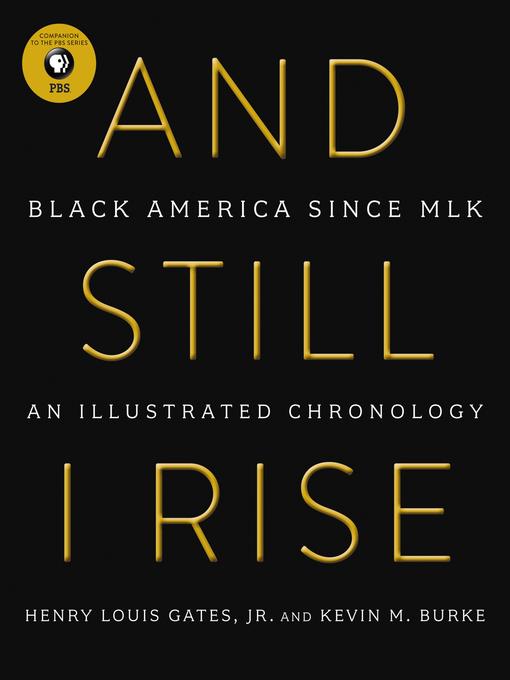
And Still I Rise
Black America Since MLK
کتاب های مرتبط
- اطلاعات
- نقد و بررسی
- دیدگاه کاربران
نقد و بررسی

September 15, 2015
A stirring chronology of advances-and some backward steps-in the long struggle for African-American civil rights. The subtitle is a touch imprecise, for Martin Luther King is still alive at the beginning of Gates (African-American Studies/Harvard Univ.; Finding Your Roots, 2014, etc.) and Burke's compendium, a companion to the forthcoming PBS series. It is Malcolm X, instead, who falls just two pages in, a victim of an internal struggle within the Black Muslim movement. As the authors observe, his memoir soon became "a canonical text for the Black Power movement," selling 6 million copies within 10 years. Ten days after Malcolm's funeral, hundreds of civil rights marchers were beaten in Selma, Alabama, launching King's march to Montgomery and affirming the commitment of the Lyndon Johnson administration to civil rights at the federal level. Two dozen pages in, and King has fallen as well, killed at the age of 39, "the same age Malcolm X was when he was assassinated three years prior." The year 1968 would mark much upheaval, symbolized by medalists Tommie Smith and John Carlos' raising of the Black Power salute at the Mexico City Olympics. Gates and Burke chart political and social events alongside the incalculable influence of black culture on mainstream American culture, from Broadway (James Earl Jones, "long before he is known as the voice of Darth Vader," won a Tony in 1969) to music ("Although most of the audience is white, African American performers star at the three-day Woodstock music festival in upstate New York") to sports and science, the latter represented most visibly by the immensely popular interpreter of cosmology Neil deGrasse Tyson. Presented in accessible entries seldom exceeding 100 words, the chronology is richly illustrated with images both iconic and seldom seen, making this especially useful as a visual reference for readers too young to have scenes from the early years burned into their memories. A must for the look-it-up shelf and a poignant reminder of how far we have come-and have yet to go.
COPYRIGHT(2015) Kirkus Reviews, ALL RIGHTS RESERVED.

September 15, 2015
Since Martin Luther King Jr.'s enormous contribution toward achieving racial justice in the U.S., scores of others have made their own contributions, large and small, to realizing equality. Gates and Burke offer a chronology of achievements from 1965 to the present. In leadership, they cite Malcolm X, John Lewis, Daniel P. Moynihan, President Lyndon Johnson, Jesse Jackson, Nelson Mandela, President Barack Obama and many others. Among others they note who changed the cultural landscape are Morrie Turner, creator of Wee Pals and the first African American to have a syndicated comic strip, and Judith Jamison in her debut with the Alvin Ailey American Dance Theater. Gates and Burke highlight contributions in politics, the women's movement, music, fashion, sports, science, and technology. Each entry is accompanied by photographs, striking images depicting major moments in African American history since 1965, including contemporary images of a mourner leaving a message at the memorial for Michael Brown in Ferguson, Missouri and of a marcher protesting the murder of Eric Garner in New York. This is an amazing collection of images of achievement on the long road to equality in the U.S.(Reprinted with permission of Booklist, copyright 2015, American Library Association.)

October 1, 2015
Titled from a 1978 Maya Angelou poem, this companion to the documentary PBS series of the same name offers an illustrated year-by-year chronicle highlighting epic phenomena and trending events in African American history and culture since the landmark civil rights victories of 1964-65. Harvard University scholars Gates (director, Hutchins Ctr. for African & African American Research; Life upon These Shores) and Burke (director of research, Hutchins Ctr. for African & African American Research) erect a platform for various voices to recall what happened where and when and to challenge historical memory with hard questions about black community and identity. Discussing glory, irony, pain, and triumph, Gates and Burke expose the breadth and depth of black culture's infusion into the American mainstream from comedy to fashion to music while exposing and exploring divisions and divisiveness among blacks as class differences and diverging consciousness magnify increasing inequalities amid expanding opportunities. VERDICT This heavyweight production in the form of a combination picture and reference book suitable for the classroom, the reference desk, or the coffee table is sure to stimulate conversation among thoughtful readers interested in the African American past, present, and future. [See Prepub Alert, 4/6/15.]--Thomas J. Davis, Arizona State Univ., Tempe
Copyright 2015 Library Journal, LLC Used with permission.

May 1, 2015
Alphonse Fletcher University Professor and the director of the W.E.B. Du Bois Institute for African and African American Research at Harvard, outstanding scholar Gates offers an overview of African American (and hence American) experience over the last six decades. From the assassination of Malcolm X and the passage of the Civil Rights Act, to the accomplishments of black artists and intellectuals and the O.J. Simpson case, to the election of President Barack Obama and the murder of Trayvon Martin, it's been an extraordinary blend of achievement and continuing struggle. A companion to the PBS series.
Copyright 2015 Library Journal, LLC Used with permission.

























دیدگاه کاربران